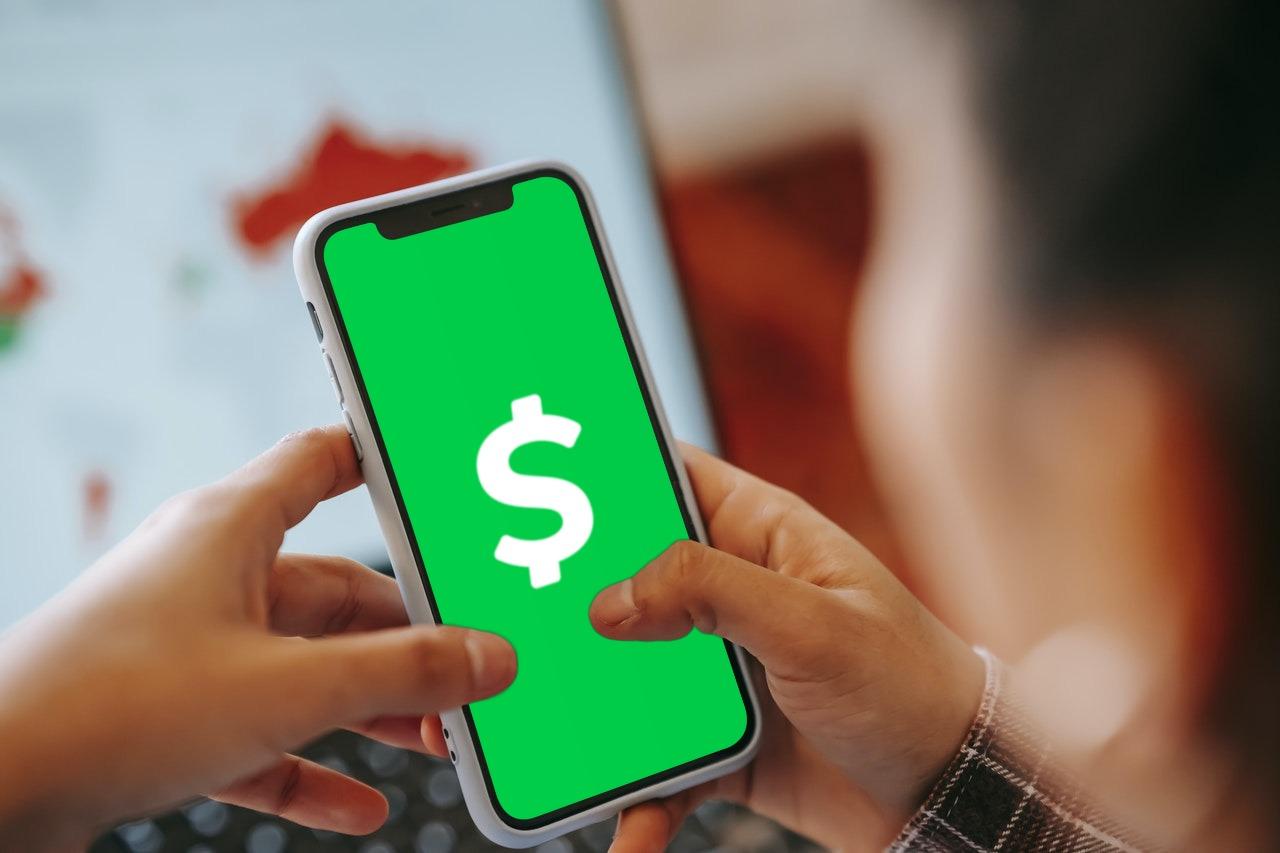Last Updated on April 30, 2024
Ever use Cash App? As the world-famous financial platform is now open to everyone over 13 years-old, it’s getting more and more popular. Yet many people have come across suspicious emails and social giveaway campaigns that seem to be from Cash App. Are they genuine? Keep reading to see some of the most common fake Cash App/Cash App scams this year — and find out how to protect yourself!
Top Cash App Scams to Watch Out for
- Cash App Survey Scams
- Fake Payment Notification from Online Buyers & Strangers
- Fake Cash App Emails
- Fake Cash App Giveaways
Cash App Survey Scams
Scammers frequently use survey scams designed to steal people’s personal and financial information, and they’re almost always sent through text messages. Below is an example of a Cash App survey scam text message:
- You have a $1,000 pending depost from @CA$HApp. CIaim it by filling out this 5 question survey T0DAY: <URL>
If you were to click on the URL in the message (removed in the above example), you would be taken to a fake survey page such as the one below.
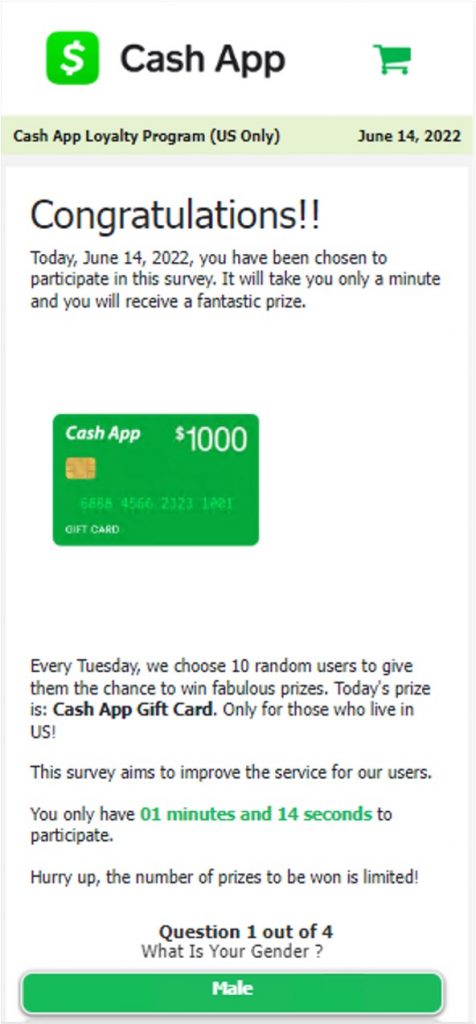
The page will state that if you complete a survey, you can claim a free gift. In the above example, the free gift is a $1000 gift card, and you only need to answer four short questions. Sounds pretty good, right?
Well, no, because you will never actually receive the free gift, and after completing the survey, you will need to provide lots of personal and financial information — all of which will be sent directly to the scammers.
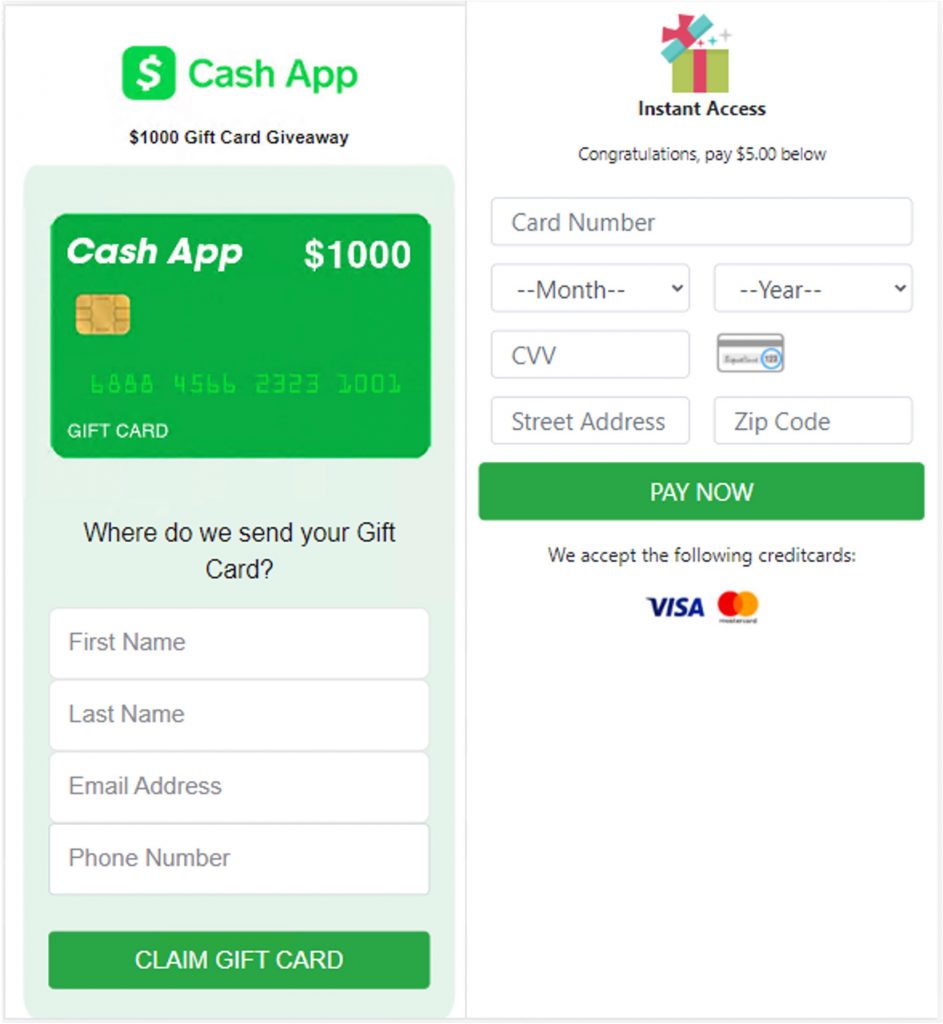
If you were to send your information to the scammers, they could use it to commit any number of cybercrimes, including identity theft.
Protecting Your Identity and Personal Info
Looking for a way to protect yourself from account takeovers, dangerous websites, and scams? Check out our newly launched service: Trend Micro ID Protection.
With ID Protection, you can surf the web safely and confidently, but it’s also got all the tools you need to prevent unauthorized access to your online accounts, improve your online privacy, and shield against identity theft and fraud. Enjoy a 100% unrestricted, 30-day free trial of ID Protection.‘s paid version, so that you can take advantage of all its awesome features and start securing your identity and privacy today! Click the button below to get started:
Fake Cash App Notification from Online Buyers & Strangers
Impersonating Cash App, scammers falsely claim that your Cash App account have received a payment.
1. Fake Cash App Payment Targeting Online Sellers
In this case (source: Reddit), a victim was selling products on Facebook Marketplace, and the buyer (actually a scammer) requested payment via Cash App. Then, they sent a fake Cash App payment notification, telling the seller that the balance would only show up on their Cash App account AFTER the package was sent. Guess what? There was NO cash transacted.
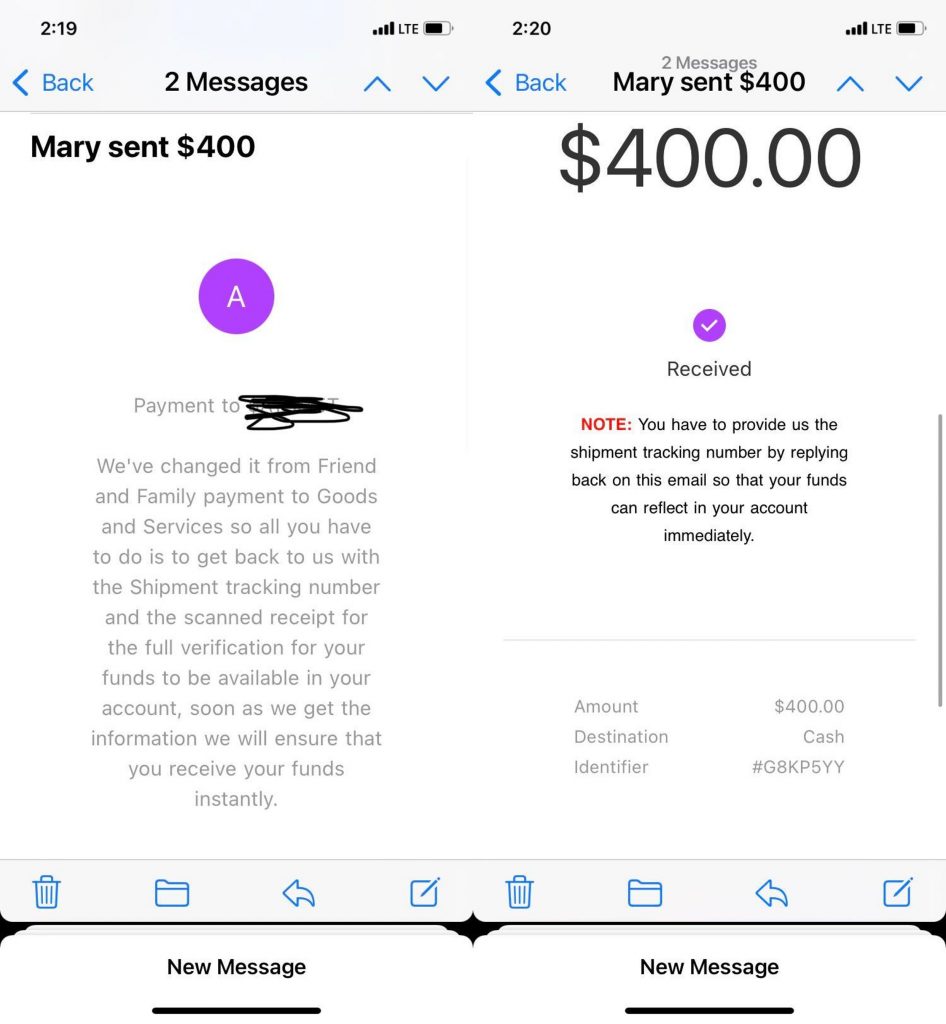
If you take a closer look, you will find that the sender’s email address is a fake Cash App email:
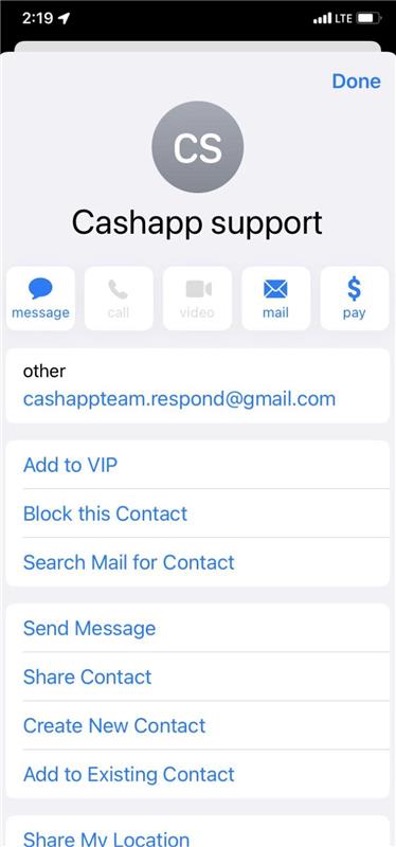
Safety Tips: Check the Email Address
Remember, according to Cash App: “verified emails from Cash App will always come from a @cash.app, @square.com, or @squareup.com address. If you have an open brokerage account you may receive emails from support@drivewealth.com.”
2. Fake Cash App Receipts from Random Strangers
In other instances, scammers claim that they’ve sent money to your Cash App account by accident and ask you to return the amount. Or they sometimes offer to give you a large amount of money, but to get the money you’ll have to pay a small fee (for processing/advances/taxes etc.). Again, NO money will be sent to you. Don’t be a victim!
Cash App Phishing Emails
Another common Cash App scam is via phishing emails — scammers pose as Cash App and send you emails with phishing links, trying their best to trick you into clicking on them. Their ultimate goal is to steal your personal information.
These phishing links often lead to fake online survey pages that state you can claim a gift by completing an online questionnaire. Or in other instances, the links take you to fake Cash App log-in pages that require you to submit log-in credentials. Scammers can record all the credentials you enter on these pages and use them to hack into your Cash App account and withdraw your money. They could even use your information to commit identity theft. Don’t let them!
1. Fake Cash App Payment Notification
Similar to what we’ve mentioned above, scammers send you fake Cash App payment notification, only that in an email phishing attempt, they instruct you to click on embedded buttons (leading to phishing websites) to view details.
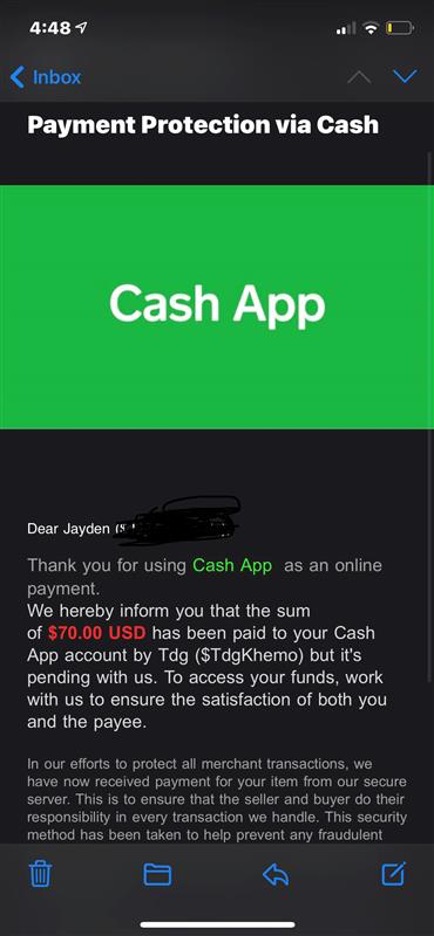
2. Fake Cash App Account Security Alert
Scammers also send out fake security alerts. They may claim that there are security issues with your account or that you’ve requested some change in credentials. To settle the issues, you are asked to visit the attached phishing link, taking you to a fake Cash App page where you will have your log-in data exposed.
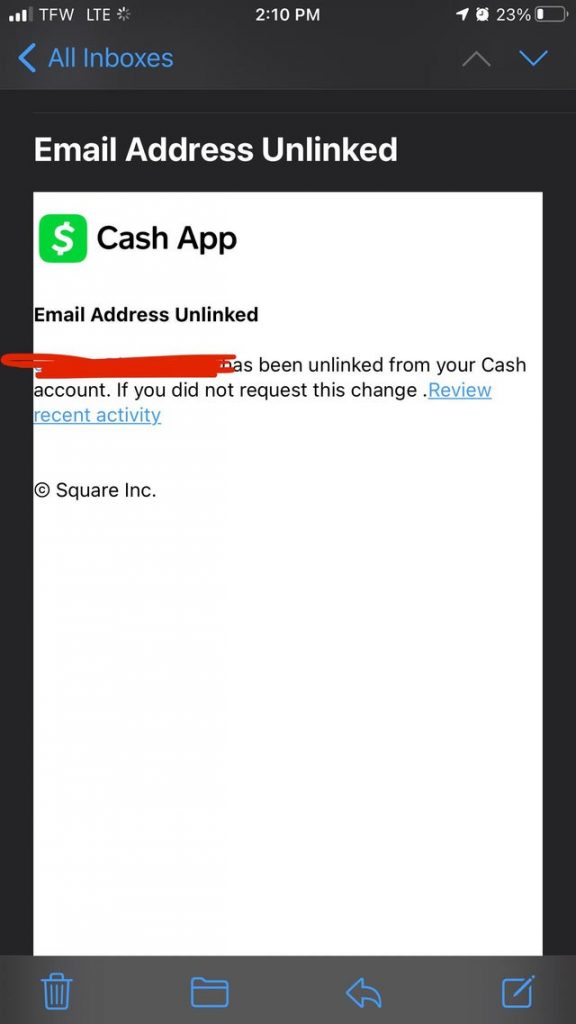
Fake Cash App Giveaways
Cash App holds giveaway campaigns every now and then, for example, back in 2019 they had several giveaways called #SuperCashAppFriday on Twitter, attracting many users to participate. However, posing as Cash App scammers used the campaign to create fake offers, urging people to retweet their tweet and “direct message” them to win money. Instead, scammers would seek to attain your Cash App credentials or instruct you to transfer money to them.
Here is an example (note that there is no blue check mark i.e., non-verified):
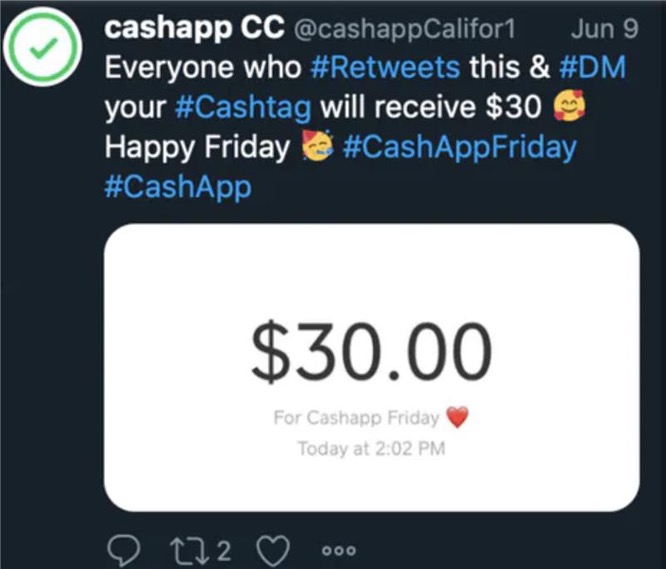
Recently, Cash App has been holding another giveaway campaign called “Fortune4Days.” Stay alert and don’t fall for a bogus one!
How to Protect Yourself from Cash App Scams
- Double-check the sender’s mobile number/email address.
- Free gifts are always a major red flag. Don’t believe giveaway campaigns held by unverified social media accounts!
- Reach out to Cash App directly for help and support through the app itself or at its official website.
- NEVER click links or attachments from unknown sources.
- Check if any of your PII has been leaked regularly using Trend Micro ID Protection.
Did you successfully spot the scams? Remember, always CHECK before giving out personal information. If you found this article helpful or interesting, please do SHARE it to help protect friends and family! Also, please consider clicking the LIKE button below and leaving a comment to tell us what you think.
1 Comments
- By Christopher Harrington | April 26, 2023
